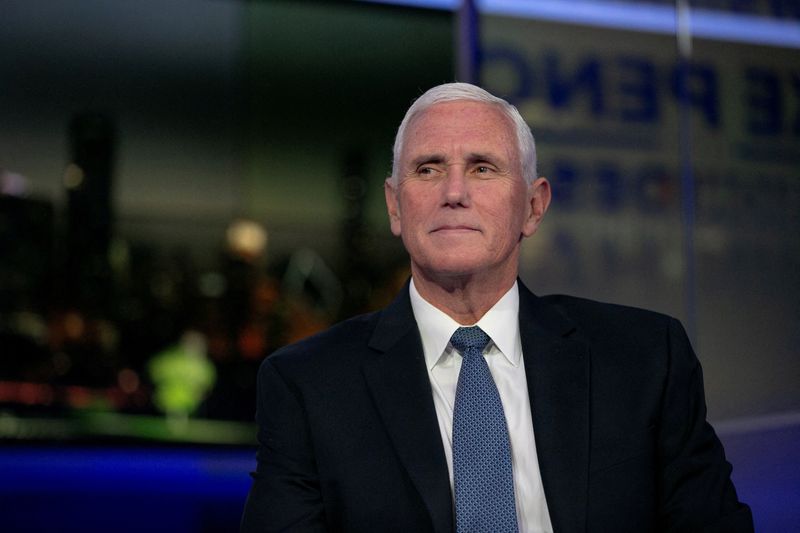Former US VP Pence drops out of Republican presidential campaign
2023.10.28 15:05

© Reuters. FILE PHOTO: Republican presidential candidate and former U.S. Vice President Mike Pence sits down with NewsNation anchor Leland Vittert (not pictured) for a town hall event at NewsNation’s headquarters in Chicago, Illinois, U.S., September 13, 2023. REUTE
By Alexandra Ulmer and Tim Reid
LAS VEGAS (Reuters) -Former U.S. Vice President Mike Pence ended his cash-strapped presidential campaign on Saturday, after struggling for months to convince Republican voters he was the best alternative to the man he once served with unswerving loyalty, Donald Trump.
“To the American people I say: This is not my time,” Pence told attendees at the Republican Jewish Coalition donor conference in Las Vegas.
Pence, 64, publicly broke with Trump, lambasting the former president for his role in the Jan. 6, 2021, insurrection at the U.S. Capitol. Pence gambled that Republican primary voters would reward him for following the U.S. Constitution rather than obeying Trump, who wanted him to overturn the 2020 election results.
But Trump’s base of core supporters never forgave Pence for overseeing the certification of Democrat Joe Biden’s election. They viewed Pence’s actions in his ceremonial role as president of the U.S. Senate as a supreme act of disloyalty to Trump, who has become the runaway frontrunner in the Republican nominating race.
Trump has built one of the biggest primary opinion poll leads in U.S. electoral history. Polls show a majority of Republican voters have embraced, or do not care about, Trump’s lie that the 2020 election was stolen from him and his subsequent efforts to overturn the result.
Pence stopped short of endorsing anyone in his speech on Saturday, but in an apparent swipe at Trump, called on Americans to select someone who appeals to “the better angels of our nature” and can lead with “civility.”
Pence failed to attract enough anti-Trump Republican primary voters, and donors, to sustain a candidacy that has languished in the low single digits in opinion polls and struggled to raise money since he announced his White House bid in June.
As a result Pence, a stolid campaigner short on charisma, was low on cash by October and despite spending time and resources in the first Republican nominating state of Iowa, had failed to catch fire there.
When his campaign released Pence’s third quarter fundraising totals on Oct. 15, his candidacy was $620,000 in debt and only had $1.2 million cash on hand, far less than several better-performing Republican rivals and insufficient to sustain the financial demands of a White House race.
In several past elections, former vice presidents who have competed to become the White House nominee have succeeded, including Republican George H.W. Bush in 1988 and Democrat Al Gore in 2000.
This year, Pence was up against the political juggernaut that is Trump, along with other rivals who appealed more to anti-Trump primary voters and donors, including former South Carolina Governor Nikki Haley and Florida Governor Ron DeSantis.
Pence ran as a traditional social and fiscal conservative, and a foreign policy hawk, calling for increased military aid to Ukraine and cuts in welfare entitlement spending. But that brand of Republicanism has been eclipsed in the Trump-era by full-throated populism and “America First” isolationism.








